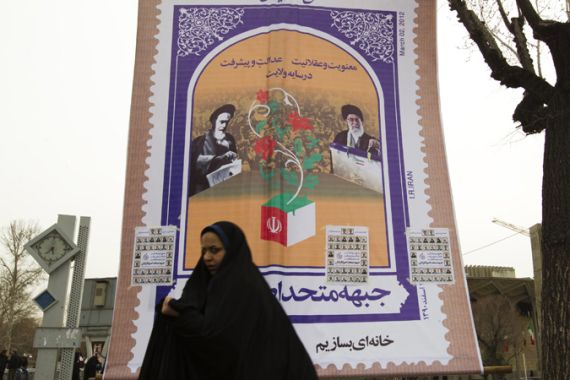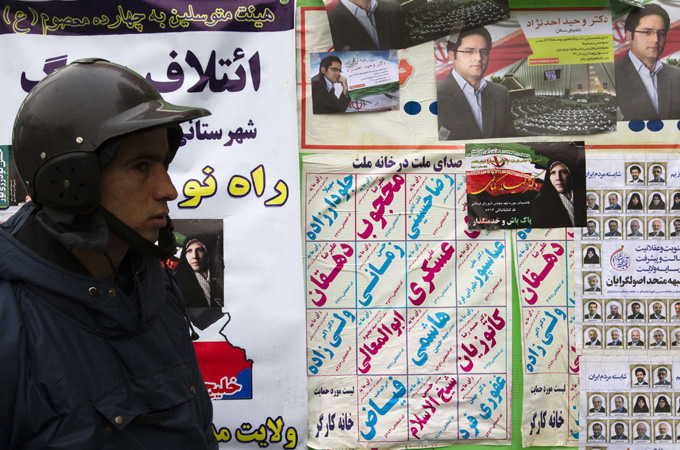What it takes to run for Iran’s parliament
As two experts explain, winning a seat in Iran’s parliament is no simple undertaking.

 |
|
In addition to approving parliamentary candidates, the Guardian Council also selects presidential candidates [Reuters] |
Iran’s March 2 parliamentary elections will mark the first time the country has gone to the polls since the disputed 2009 presidential elections in which President Mahmoud Ahmadinejad won his second term.
There are 290 parliament seats up for grabs and the country’s Guardian Council announced last week that 3,444 candidates had been approved to run for them.
Al Jazeera asked Reza Marashi, research director of the National Iranian American Council, and Mehrzad Boroujerdi, professor of political science at Syracuse University, to explain Iran’s complex political process.
Who decides if a person can be a parliamentary candidate?
Reza Marashi: The registration of candidates running for the parliament is handled by the Interior Ministry and vetted by the Guardian Council.
Mehrzad Boroujerdi: There are three levels at which a candidate’s credentials have to be approved. Upon the completion of the registration period, provincial governors, county governors and district governors form a committee to investigate the background of candidates.
They often send inquiries to the Ministry of Intelligence, the judiciary, the police and the National Organization for Civil Registration to inquire about the candidate’s past.
They report the list of qualified candidates within a 10-day period to the Provincial Supervisory Councils, an arm of the Council of Guardians, and the Central Supervisory Body for the election, an arm of the Ministry of Interior.
These local governors can inform the candidate in a written and private letter as to why he or she was disqualified. If the candidate asks for proof of the charges against him, the responsible authorities are supposed to provide that evidence as well. However, this rarely happens in reality.
If still unconvinced, the candidate can submit a complaint within four days and defend himself before the local executive committee. These committees have to respond to the complaint within a seven-day period.
The Provincial Supervisory Councils [PSC] can accept or reject the decision of the provincial governors. The list approved by the PSC will then be forwarded to the Council of Guardians to have the final say. The Council can approve the recommendations or overrule PSC decisions and reinstate disqualified candidates.
How does one run for parliament in Iran and what, generally speaking, are the qualifications?
|
Iran’s Parliament: Who can run?
|
RM: Technically, all you have to do is register at the assigned government office in your respective province to declare your candidacy. In practice, however, the cost of running a successful campaign and the required political connections often make declaring candidacy both cost and time prohibitive for those who haven’t already served as part of the system in some capacity.
[What’s required to qualify are] a deep, demonstrated belief in Islam – except for the designated religious minority seats, a demonstrated commitment to the revolution and its ideals, and more recently, a Master’s degree. … Qualifications and disqualifications can be rather arbitrary – as determined by the interior ministry, guardian council, and lots of back room politicking … and the regime prefers to keep it that way to maximise its flexibility over the process and overall outcome.
MB: The [following] persons are [among those] deprived of the right to register as a candidate unless they resign their post at least two months prior to the election and are not employed in that position in any form:
The president and his advisers and assistants, the secretary-general of the Expediency Discernment Council and his advisers, advisers and assistants of the president chiefs-of-staff of the three highest offices in the three branches of government [executive, legislative, judicial], cabinet-level ministers and supervisors of the ministries, field directors of the ministries, members of the Guardian Council and the Central Supervisory Body for the election, etc.
Why might a candidate be disqualified?
MB: Anyone who does not meet [the standard criteria – see box] can be disqualified. Furthermore, anyone … affiliated with leftist organisations and nowadays the reformist camp and even Ahmadinejad followers can be disqualified. The Guardian Council has a great deal of leverage in interpreting the qualification rules.
For example, rule about “Expressed loyalty to the Constitution and progressive principle of the Absolute Guardianship of the Jurisprudent” can be used to disqualify candidates and there is not much that a candidate can do to have the Guardian Council reverse itself.
RM: The qualification and vetting process that has been practiced by the Guardian Council has served as a means of demarcating the broad contours of permissible political criticism and actions, by routinely identifying high profile candidates who have been critical of various aspects of Islamic rule and who, though allowed to participate in previous elections, are deemed no longer acceptable.
Elections have also functioned as mechanisms through which evolving relationships among political factions that have both competed and shared power since the inception of the Islamic Republic are regulated and recalibrated.
This is why the questions surrounding Iranian elections always go beyond winners and losers, and also focus on matters such as the percentage of people who voted – anything over 50 per cent is considered a sign of the system’s legitimacy by the regime.
How many candidates were disqualified in the 2008 parliamentary elections? What’s different this time around?
RM: In the 2008 elections, the percentage of disqualifications by the Ministry of Interior was approximately 31 per cent. After backroom politicking by various regime insiders, the percentage of disqualified candidates was reduced by the Guardian Council to 27 per cent.
The last two parliamentary elections were marked by the Guardian Council’s disqualification of reformist candidates, which set the stage for the conservatives to return to and consolidate power. Nothing has changed in this respect, but this time there is an added twist: With no reformists left to target, conservative factions are now openly fighting one another. Having seen what happened to the reformists, it is clear to all those vying for power that these elections are about political survival and controlling the future of the Islamic Republic.
MB: The number of registered candidates in 2008 parliamentary elections was 7,597 and in the present election it is 5,405. The drop of 2,192 candidates can be attributed to two main factors.
Beginning with the 2012 elections, candidates have to have at a minimum a Master’s degree to stand for elections. In the previous elections a BA degree was deemed sufficient.
This [drop] can also reflect the lingering dissatisfaction with the controversial results of the 2009 presidential elections, accusations of vote rigging, as well as the fact that numerous reformist candidates have decided to boycott the elections.
